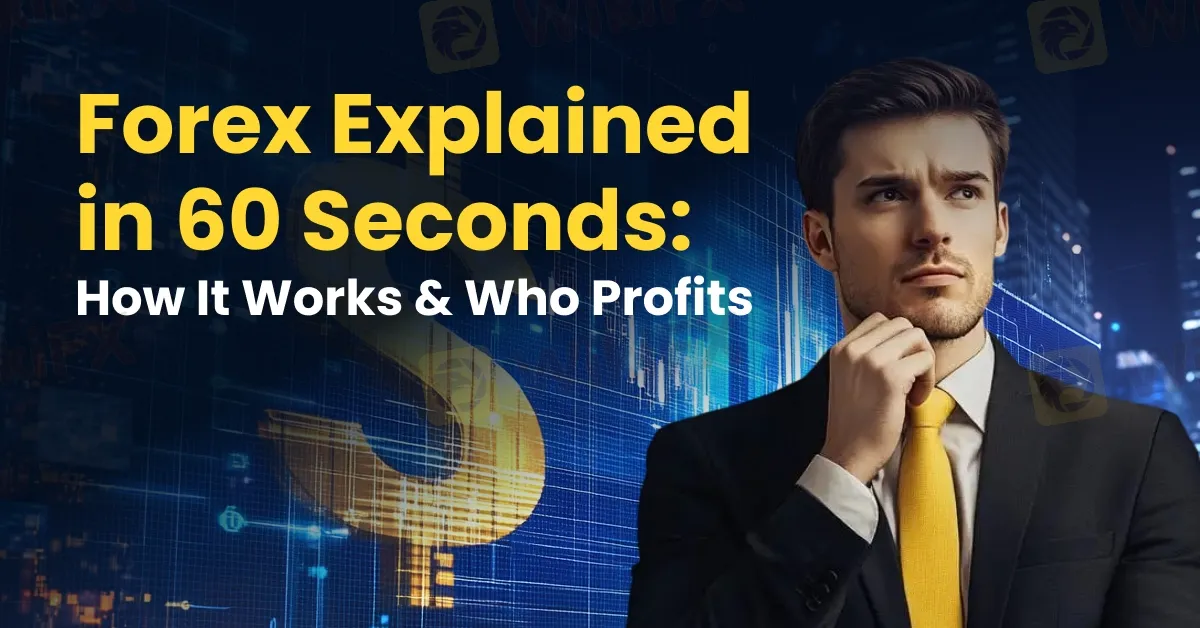简体中文
繁體中文
English
Pусский
日本語
ภาษาไทย
Tiếng Việt
Bahasa Indonesia
Español
हिन्दी
Filippiiniläinen
Français
Deutsch
Português
Türkçe
한국어
العربية
Forex Explained in 60 Seconds: How It Works & Who Profits
Abstract:Before diving into the forex market, it’s crucial to understand its mechanics, risks, and profit potential. Without a clear grasp of how forex operates, you risk losing money instead of making it. Here’s a concise breakdown to help you navigate this dynamic financial market.

Before diving into the forex market, it‘s crucial to understand its mechanics, risks, and profit potential. Many traders jump in, lured by stories of quick wealth, only to realise that success requires knowledge, strategy, and discipline. Without a clear grasp of how forex operates, you risk losing money instead of making it. Here’s a concise breakdown to help you navigate this dynamic financial market.

The foreign exchange (forex or FX) market is the largest financial market in the world, with a daily trading volume exceeding $7 trillion. Unlike stock markets that trade on centralised exchanges, forex operates over-the-counter (OTC), meaning currencies are traded electronically across global financial centres. Participants include banks, hedge funds, corporations, governments, and retail traders. Trading takes place 24 hours a day, five days a week, as major financial hubs in London, New York, Tokyo, and Sydney overlap.
Forex trading involves buying one currency while simultaneously selling another. Currencies are quoted in pairs (e.g., EUR/USD, GBP/JPY), where the first currency is the base, and the second is the quote. If a trader believes the base currency will strengthen against the quote currency, they buy the pair; if they expect it to weaken, they sell.
Trades are executed through brokers or trading platforms, often with leverage—a tool that allows traders to control larger positions with a fraction of the capital. However, leverage amplifies both potential gains and losses, making risk management essential.

Forex brokers make money in several ways. Most charge a spread—the difference between the bid (buy) and ask (sell) price. Some also charge commissions per trade or profit from traders' losses through a dealing desk model.
On the other hand, retail traders aim to profit from price fluctuations by speculating on market movements. Successful traders rely on technical analysis (charts and indicators), fundamental analysis (economic events and news), and risk management strategies. However, due to market volatility and high leverage, many retail traders lose money rather than turn a profit.

The forex market itself is not a scam. In fact, contrary to general beliefs, it is a legitimate financial marketplace. However, due to its decentralised nature, it has attracted scams in the form of fraudulent brokers, Ponzi schemes, and misleading ‘get-rich-quick’ trading courses. The key to staying safe is choosing a well-regulated broker (licensed by the FCA, CySEC, or another reputable authority) and avoiding unrealistic profit promises.
Forex trading offers vast opportunities, but it is not a shortcut to wealth. Education, strategy, and risk management are vital for success. Before risking real money, traders should practise on demo accounts and understand the markets complexities. With the right approach, forex can be a rewarding endeavour, but only for those who treat it with the respect and knowledge it demands.

Disclaimer:
The views in this article only represent the author's personal views, and do not constitute investment advice on this platform. This platform does not guarantee the accuracy, completeness and timeliness of the information in the article, and will not be liable for any loss caused by the use of or reliance on the information in the article.
Read more

Forex Hedging: Is It a Trader’s Safety Net or Just an Illusion?
In the volatile world of forex trading, risk is inevitable. One widely used strategy is forex hedging, which is a useful technique designed not to eliminate risk entirely, but to reduce its potential impact. As global economic uncertainty persists, understanding how hedging works could be an essential addition to a trader’s toolkit.

OctaFX Back in News: ED Attaches Assets Worth INR 134 Cr in Forex Scam Case
The Enforcement Directorate (ED) in Mumbai has attached assets worth around INR 131.45 crore. This included a luxury yacht and residential properties in Spain. Read this interesting story.

Is forex trading profitable?
Many traders think that forex trading can make quick profits, but the truth is more complex. While some people do make money in the forex market, others fall prey to its many pitfalls because, in this industry, the scams and misleading promises are widespread.

Admiral Markets: A Mix of Regulation and Risk
Despite multiple licenses, Admiral Markets presents potential red flags that traders should not ignore, including a suspicious clone alert and disclosure by Malaysia’s Securities Commission.
WikiFX Broker
Latest News
Forex Hedging: Is It a Trader’s Safety Net or Just an Illusion?
OPEC+ members agree larger-than-expected oil production hike in August
Top Wall Street analysts are pounding the table on these 3 stocks
Stock futures fall after Trump team says tariffs will go into effect on Aug. 1: Live updates
Asia-Pacific markets set for mixed open after Trump shifts goalposts on tariffs again
CNBC Daily Open: Most people don't start a political party after separation
Asia-Pacific markets mostly lower after Trump shifts goalposts on tariffs again
Currency Calculator


